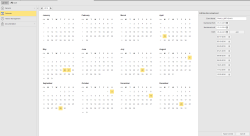 Calendar Object (CALE)
Calendar Object (CALE)
A Calendar object is a container for calendar events. A Calendar Event is a set of rules that result in selecting certain days in the calendar. You can include as many Calendar Events as you need in a Calendar object. You can also reuse the events assigned to a Calendar when defining another one.
Object Definition
Object class: Active object
Object type/Short name: CALE
You will probably have to create several calendars to handle your processes. For each calendar, you will also have to create various Calendar Events that specify the dates and times that will result of that calendar.
This means that creating Calendar objects consists of multiple steps. You can think of it as defining layers of date/time definitions, from very simple to highly complex, that you can then combine. For example:
- You can start creating a basic Calendar object that defines the weekdays and the weekends, each of them being a Calendar Event.
-
Then you can create the next layer in a Calendar object that defines the working days, which result from subtracting the national holidays from the weekdays. You can reuse the weekends event of the basic calendar.
Automic products are supplied with standard Calendar Events for national holidays in most of the countries. You can use and edit them, if necessary, or create your own ones.
- Building up on this, you may want to execute certain tasks only on the last day of the month, provided it is a working day, so you can create this calendar based on the working days one.
- For the cases in which the last day of the month is a non-working day, you may want to have two possibilities:
- Skip processing the tasks altogether.
- Postpone processing to the next working day.
Again, you define this calendar building up on the previous one.
These are but a few uses cases; the Calendar object is a very flexible tool that can cover virtually any combination of events to manage execution start dates and times.
Automic strongly recommends creating several small Calendar objects with few events each instead of large complex ones. This boosts flexibility and helps achieve well-performing calendar calculations. Storing Calendar Events referring to each other in one Calendar object is also a good practice, as this facilitates transporting, importing and exporting them.
Supplied Standard Calendars
Client 0 is supplied with a number of standard calendars and events can be assigned to objects in all the clients in your system.
Defining a Calendar Object
You define Calendar objects in the following pages:
- Standard pages that are always available, no matter what type of object you are defining:
-
The object-specific page described in these topics.
For example:
The first day of the week can be either Monday or Sunday. It is set via the FIRST_DAY_OF_WEEK key in the UC_CLIENT_SETTINGS variable (see UC_CLIENT_SETTINGS - Various Client Settings).
Take a look at the Examples of Calendar Objects topic for details on how to create Calendar objects and Calendar Events.
Working with Calendar Objects
As happens with all other objects, a number of associated functions is available for Calendars. Right-click one to open the context menu. See Working with Objects.
As regards importing/exporting, transporting and duplicating Calendar objects, please take the following into account:
Duplicating Calendar Objects
There is a peculiarity when duplicating calendars. It is explained in the example shown below:
- Calendar A has a Group and an Offset Calendar Events, both of which refer to one of the Calendar Events.
- Calendar A is duplicated, the copy is called B.
- The Group and an Offset Calendar Events of calendar B, however, do not refer to the Calendar Event in B but to the one in A.
Transporting and Importing/Exporting Calendars
When transporting, importing and exporting calendars, make sure that you also do so with all the calendar events they refer to, also if they are defined in calendars different to the one you are transporting.
Calendars are re-calculated after each transport/import/export. This may cause error messages in the log file if the calendar is re-calculated before the calendar events to which it refers have been read. Such messages can largely be ignored because an automatic follow-up calculation of calendar events will take place, without any manual interference being required.
See also:
